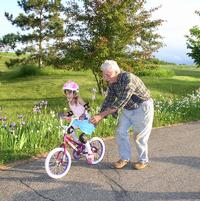One of the most common roles that older people have around the world is being a grandparent. From Europe to US, from South America to Asia, grandparents provide support to their children when have their own families. They help them to raise their children and they transmit values to the new generation.
Recent studies have highlighted that in Europe, 58% of grandmothers and 49% of grandfathers look after at least one of their grandchildren aged <16 in the absence of their parents[1]. In the US one in four children (< aged 5) has been cared for by grandparents[2], while in China, more than 20% of grandparents provided four or more hours per week of help to grandchildren[3].
Recognising the strong link between grandparents and grandchildren, several experts have tried to assess the benefits of this relationship for the grandchildren. The majority of them have agreed on the strong positive impact of grandparents on children’s life, increasing their happiness and their self-confidence. Researchers are, however, still unclear about the inverse relationship. What are the consequences of looking after grandchildren for health and well-being of grandparents? The answers to this question are very mixed.
So, for example, there is no agreement among researchers that being a grandmother or grandfather has a positive impact on health. Quite the contrary. Several US studies have highlighted a negative association. Large representative surveys of Americans have shown that the effect of grandparenting on health depends on the amount of time grandparents spend in this role. It seems that older people who spend a lot of time taking care of their grandchildren have an increased risk of developing physical and mental health problems. The healthiest grandparents are those who have regular contacts with their grandchildren, but are not always with them.
We might look for the explanation for this unexpected result in the social and economic circumstances of the people who are acting as grandparents rather than in the role itself. Does it matter that the combinations of social, economic and cultural circumstances in which looking after grandchildren is not a choice but an “imposed” condition? It is very clear, for example, that some families cannot afford to pay for childcare whereas other can. Many people live in places where childcare services for young children are scarce or absent. And even if they are available, some families may decide that it is better to keep their children at home for the first few years of their life.
The life course perspective has come to dominate the way in which social scientists investigate well-being in individuals. Our past and present circumstances condition our future years. Positive or negative experiences, major family or work events, the advantages or disadvantages that define our circumstances in early or middle life have strong and lasting effects later in life. If we spell out what this means for grandparents, we have the hypothesis that a lifelong position of social disadvantage makes an independent contribution to poor health outcomes in older people who combine the most intensive grandparenting roles with a socially disadvantaged position in the present. Those older people, on the other hand, who combine occasional or supplementary childcare responsibilities with relative affluence and good health - are likely to be those who have benefited from lifelong advantages of one kind or another.
A recent analysis[4] of a European longitudinal study (i.e. where the same individuals are repeatedly interviewed over a period of time) looks at this association in more detail. What the authors have is information about education, work trajectories, health conditions, participation in social activities and wealth for a large sample of individuals through their life course. They are able therefore to reconstruct life histories for grandparents in the sample histories and analyse their relation with health. The data show a positive association between grandchild care work and better physical health for grandmothers, but not for grandfathers.
It seems plausible to hypothesize that a grandparenting role provides older people with a sense of belonging, attachment and usefulness, and that this would enhance well-being. Looking after grandchildren will often also lead to increasing levels of physical activity and better health behaviours. Why in women only? Perhaps this has something to do with the expectation, desire and role that they have with respect to care and family tasks.
The contradictory and incomplete answers found in the literature underline the importance not only of continuing to study the condition of grandparents in our society, but also of promoting policies and actions that enhance their well-being. Happier and healthier grandparents will have a positive impact on future generations and on all the society.
[1] Hank, K., Buber, I., 2009. Grandparents caring for their grandchildren. Findings from the 2004 survey of Health, Ageing, and retirement in Europe. J. Family Issues 30 (1), 53e73.
[2] Laughlin, L., 2013. Who's minding the kids? child care arrangements: Spring 2011. In: Current Population Reports. U.S. Census Bureau, Washington, DC, pp. 70-135.
[3] Grundy, E.M., Albala, C., Allen, E., Dangour, A.D., Elbourne, D., Uauy, R., 2012. Grandparenting and psychosocial health among older Chileans: a longitudinal analysis. Aging Ment. Health 16 (8), 1047e1057.
[4] Di Gessa, G., Glaser, K., Tinker, A., 2016. The impact of caring for grandchildren on the health of grandparents in Europe: A lifecourse approach. Social Science & Med 15, 166-175.
About the Author:
Dr Sara Zella is a Research Fellow at the Oxford Institute of Population Ageing. Sara joined the Institute in 2016 to work with Professor Sarah Harper on the research project “The impact of different work/care life courses on women’s wellbeing and quality of life in early retirement and the welfare regimes which help shape this”.
Comments Welcome:
We welcome your comments on this or any of the Institute's blog posts. Please feel free to email comments to be posted on your behalf to administrator@ageing.ox.ac.uk or use the Disqus facility linked below.
Opinions of the blogger is their own and not endorsed by the Institute
Comments Welcome: We welcome your comments on this or any of the Institute's blog posts. Please feel free to email comments to be posted on your behalf to administrator@ageing.ox.ac.uk or use the Disqus facility linked below.













